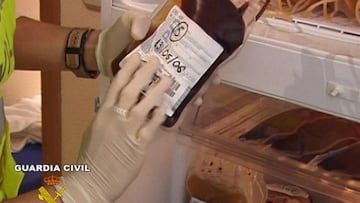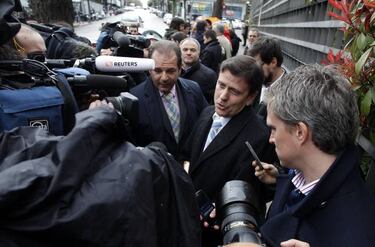Court reverses decision to destroy blood-bags
A Spanish court ruled Tuesday that authorities must be given access to blood bags seized as part of a major doping scandal affecting cycling and other sports, reversing a decision to destroy them</br><a title="Super Bowl 2018 live online: Patriots vs Eagles" href="https://en.as.com/en/2018/02/04/other_sports/1517784278_627836.html">Super Bowl 2018 live online: Patriots vs Eagles</a>

Ten years after Operation Puerto uncovered an international doping network, a court in Madrid ruled on Tuesday morning that 211 bags of blood seized by Spain’s Guardia Civil must not be destroyed and that they be handed over to entities such as the World Anti-Doping Agency (WADA), overruling a 2013 decision by a judge to destroy them on privacy grounds.
Dr. Eufemanio Fuentes absolved
However, no further action will be taken against Eufemiano Fuentes, the doctor at the centre of the doping scandal. He had previously been handed down a suspended one-year prision sentence for breaking public health laws (in the absence of anti-doping rules in Spain at the time the offences were committed).

The blood bags were originally taken from Dr Fuentes laboratory, and belong to athletes who received treatments from him, though he has refused to confirm whether the anonymous athletes were doping or not.
Back in 2013, Judge Julia Patricia Santamaria ruled that the bags were to be destroyed, thereby preventing them being used to open cases against the athletes in question.
Many in the sporting world were outraged by the decision to destroy the bags, with stars such as Andy Murray turning to Twitter to express his disgust at the ruling.
operacion puerto case is beyond a joke... biggest cover up in sports history? why would court order blood bags to be destroyed? #coverup
— Andy Murray (@andy_murray) April 30, 2013
211 blood bags on ice
Since then the 211 blood bags (originally collected in 2006) have been sitting on ice in a Barcelona anti-doping lab, with the questions as to who they pertain to and what substances they might contain up in the air to the embarrassment of Spanish sport.
The ruling was expected at the start of the year, but has been delayed, with the judges hearing the case allegedly unable to reach agreement over the final wording of the decision.
Only five cyclists were suspended after Operation Puerto, none of them in Spain: Jan Ullrich and Jorg Jaksche in Germany and Alejandro Valverde, Ivan Basso and Michele Scarponi, in Italy.
Statute of limitations on doping offences
Even where the bags are saved and the blood examined any positive findings will almost certainly go unpunished: in Spain the statute of limitations in Spain in 2006 was three years. The World Antidoping rules allowed for a period of eight years back then. Time limits that have passed to bring a case against the athletes in question.
Spanish authorities determined to take action
Related stories
That said the Spanish anti-doping agency is still determined to act over the blood, and its contents. "The bags can't pertain to nobody", they say. Something could be done they argue. In France the Senate, though an investigative commission, held in 2013 that 29 cyclists had doped in 1998, after looking at samples from that year with urine frozen in 2004.
The mystery of the blood bags, who the samples were from and what they contain could still be resolved.